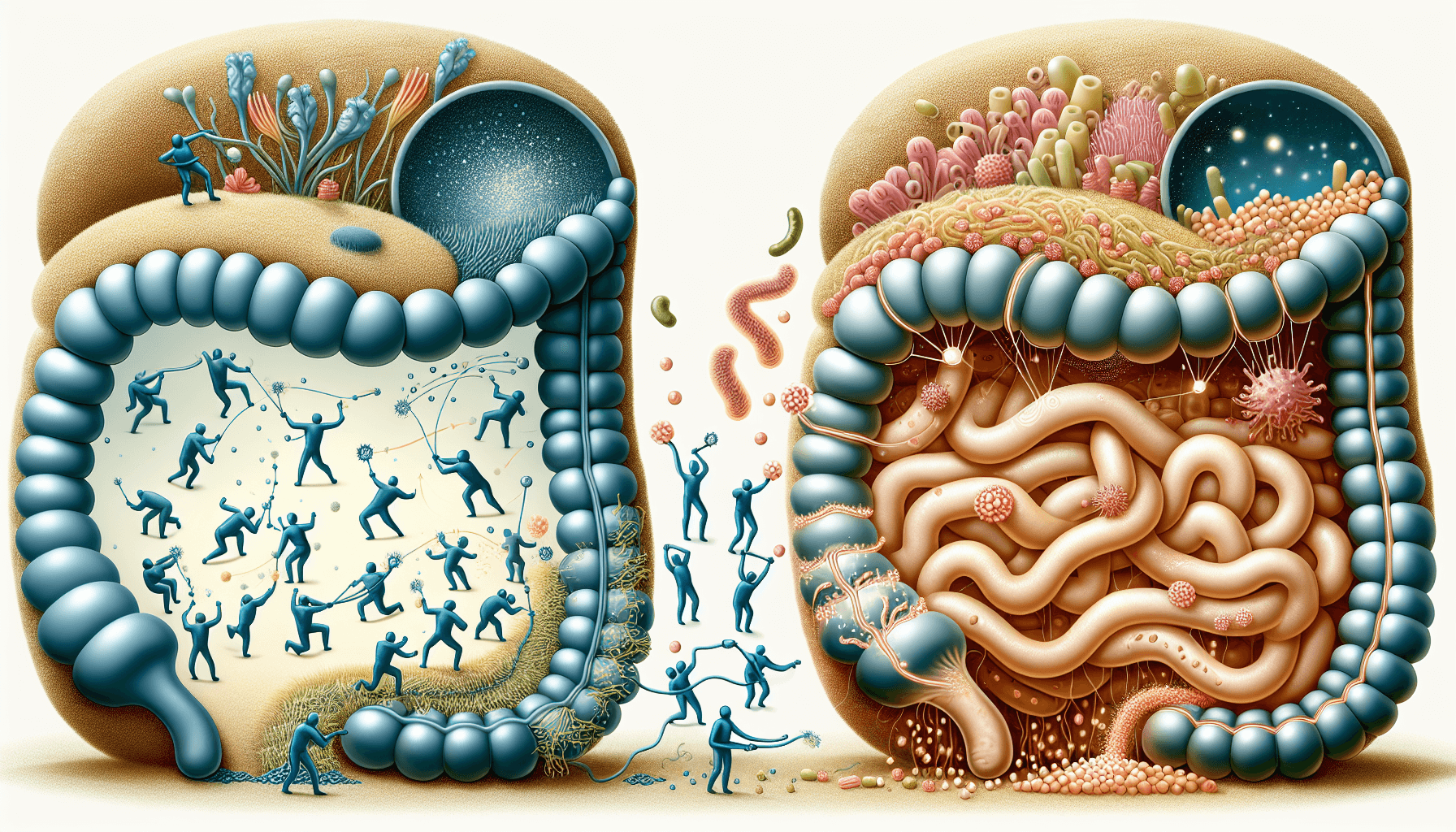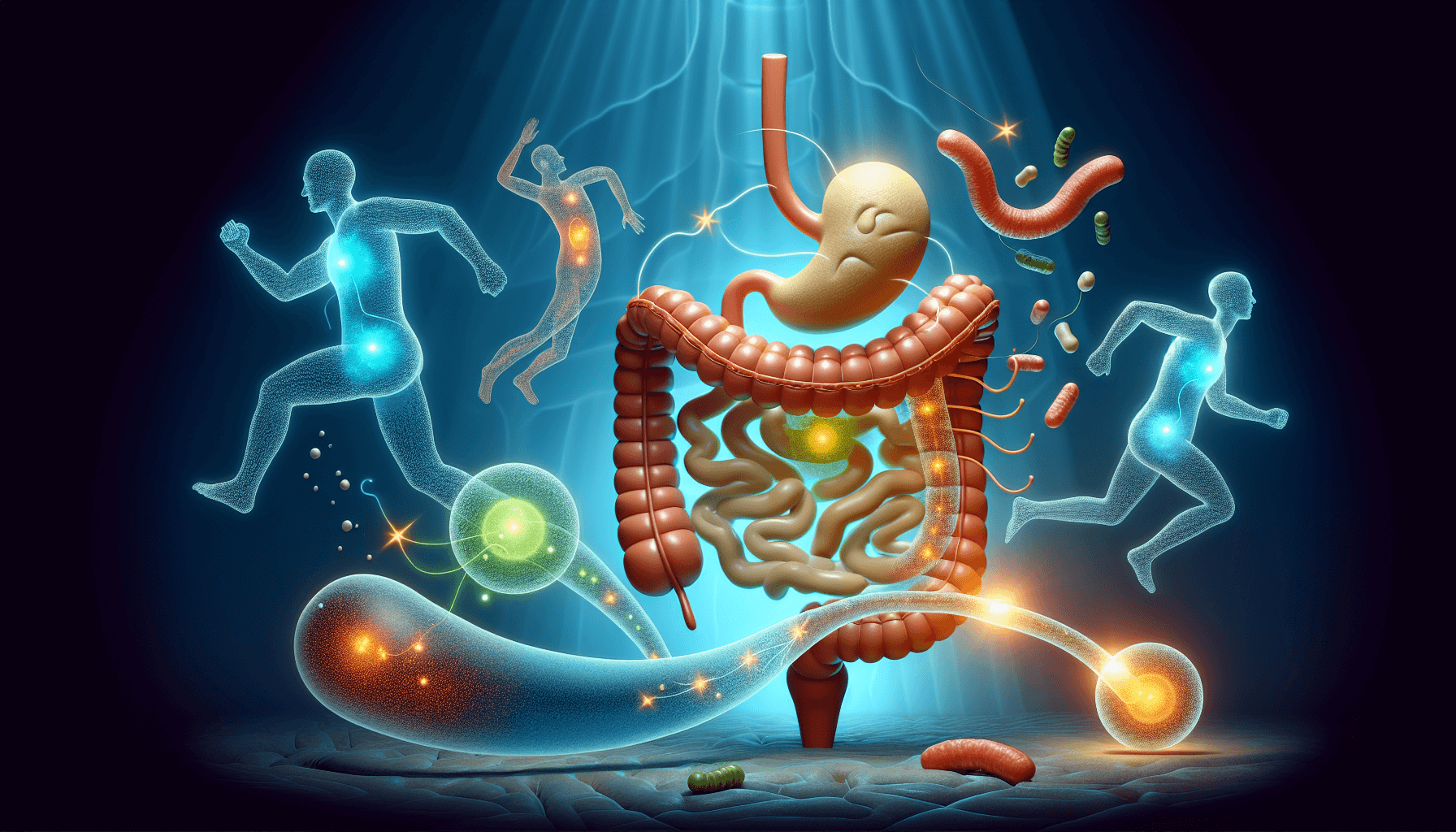* Only visible on admin mode.
Data Layer Value
Value
DataLayer - GTM_Page_Type
DataLayer - GTM_page_category
Front Row MD ID

Content
Author
Reviewed by
Date
Category
Tags
Digestive Enzyme vs Probiotic: Which is Best for Your Gut Health?
Immunity, Lifestyle, Longevity


July 5, 2024
Sydney E.
Digestive enzyme vs probiotic: which one should you choose for your gut health? Both aid digestion but work differently. This article explains their roles and helps you decide which suits you.
Key Takeaways
Key Takeaways
- Digestive enzymes and probiotics support gut health differently: digestive enzymes break down food molecules for absorption, while probiotics balance gut bacteria to maintain a healthy microbiome.
- Digestive enzymes are particularly beneficial for individuals with enzyme production deficiencies, aiding digestion and nutrient absorption. Probiotics help manage conditions like IBS and food sensitivities by maintaining gut flora balance.
- It’s safe to take digestive enzymes and probiotics together to enhance digestion and nutrient absorption, but personalized guidance from healthcare providers is recommended to address specific digestive concerns and ensure appropriate supplementation.
Understanding Digestive Enzymes
Understanding Digestive Enzymes

Digestive enzymes are proteins the body produces to break down food molecules into their building blocks for absorption.
These enzymes are essential for the digestive process, enabling us to use the nutrients found in food to give the body energy, help it grow, and perform vital functions.
Digestive enzyme production occurs primarily in the stomach, small intestine, and pancreas, with the pancreas being the primary source.
Without enough digestive enzymes, we may experience symptoms such as:
- Belly pain
- Cramps
- Bloating
- Diarrhea
- Gas
- Oily stools
- Unexplained weight loss
- indigestion
- malabsorption of essential nutrients
Types of Digestive Enzymes
Types of Digestive Enzymes
Different types of digestive enzymes break down specific nutrients.
The pancreas produces amylase, lipase, and protease to break down carbohydrates, fats, and proteins. Amylase breaks down starches, protease breaks down proteins, and lipase breaks down fats.
These enzymes are among the most important we rely on for optimal digestion.
In addition to these, the small intestine produces enzymes like:
- Lactase: breaks down lactose, the sugar found in milk
- Sucrase: breaks down sucrose, a common sugar
- Alpha-galactosidase: breaks down galacto-oligosaccharides (GOS), which are commonly found in beans, root vegetables, and some dairy products
These enzymes are crucial for digestion, nutrient absorption, and amino acid breakdown.
Sources of Digestive Enzymes
Sources of Digestive Enzymes
While the body produces many digestive enzymes, certain foods can also provide them.
Enzyme-rich foods such as:
- Pineapples
- Papayas
- Mangoes
- Honey
- Bananas
- Avocados
- Kefir
- Sauerkraut
- Kimchi
- Kiwifruit
- Ginger
These foods are often recommended to support healthy digestion, although they have a more subtle effect than enzyme supplements. While enzyme-rich foods can be beneficial, overall dietary habits play a more crucial role in digestive health.
While enzyme-rich foods can be beneficial, overall dietary habits play a more crucial role in digestive health.
Probiotics Explained
Probiotics Explained

Probiotics are live microorganisms that help balance the gut bacteria, supporting digestion, immune function, and overall health.
These beneficial microbes help control harmful microorganisms in the body, contributing to a healthy gut environment.
Probiotics are essential for maintaining a balanced microbiome, which is crucial for digestive health and overall well-being.
Probiotics work by:
- Repopulating the gut with good bacteria
- Balancing the delicate ecosystem of the gut
- Supporting digestion, absorption, the immune system, and neurotransmitter production
Types of Probiotics
Types of Probiotics
There are several types of probiotics, with the two main groups being Lactobacillus and Bifidobacterium. Lactobacillus bacteria are naturally present in the mouth, vaginal canal, and small intestine.
They play a key role in maintaining the balance of beneficial microorganisms in these areas.
Acidophilus (L. acidophilus) is commonly found in the mouth, gut, stomach, lungs, vagina, and urinary tract, making it a versatile probiotic strain.
Bifidobacterium bacteria mostly reside in the intestines and stomach, playing a significant role in gut health. Saccharomyces boulardii is a yeast that helps improve digestion and manage various digestive issues.
Sources of Probiotics
Sources of Probiotics
Probiotics can be found in various foods, particularly fermented ones.
Common sources include:
- yogurt
- kefir
- cottage cheese
- miso soup
- kombucha
- sauerkraut
- kimchi
- pickles
To provide probiotic benefits, these foods must contain ‘live and active cultures’.
Fermented foods are often recommended over supplements due to their beneficial environment for bacteria. Some probiotic foods, such as yogurt, may have additional bacteria beyond the starter cultures, enhancing their probiotic benefits.
Key Differences Between Digestive Enzymes and Probiotics
Key Differences Between Digestive Enzymes and Probiotics

Digestive enzymes and probiotics both promote digestive health, but they do so in different ways.
Digestive enzymes are protein molecules that break down different types of food molecules into their building blocks for absorption into the bloodstream.
Conversely, probiotics are living microorganisms that help balance the gut's bacterial population and can influence the production of certain digestive enzymes.
These two substances perform complementary functions in the digestive process, supporting overall digestive health.
How They Work
How They Work
Digestive enzymes operate on a lock-and-key model, where each enzyme is designed to attract and break down specific types of food molecules.
Probiotics, on the other hand, support gut health by maintaining and restoring the balance of gut bacteria.
Together, they ensure that the digestive system functions effectively and efficiently.
Can You Take Digestive Enzymes and Probiotics Together?
Can You Take Digestive Enzymes and Probiotics Together?

Taking digestive enzymes and probiotics together is safe and may be helpful to support healthy digestion and intestinal well-being.
Combining these supplements can enhance digestion by balancing the gut environment and improving the breakdown of nutrients.
Some studies suggest that probiotics enhance the outcome of enzyme supplementation, making it safe to take both together. This combination improves nutrient absorption and supports a healthy digestive system without interaction risks.
Supporting Immune Health
Supporting Immune Health
Probiotics help maintain a strong gut barrier, preventing pathogens from entering the bloodstream and supporting immune health.
The combination of digestive enzymes and probiotics can support immune system function by maintaining a healthy microbiome.
This is particularly important for individuals suffering from chronic psychological stress or recovering from prolonged illness.
Natural food sources containing digestive enzymes and probiotics, such as kefir and fermented vegetables, can also contribute to immune health.
These foods provide a natural way to support both digestion and immune function.
Choosing Between Digestive Enzymes and Probiotics
Choosing Between Digestive Enzymes and Probiotics

Digestive enzymes and probiotics offer different digestive benefits tailored to specific health needs.
Understanding your body’s needs and consulting healthcare professionals can help you make an informed decision.
Combining both might be the best approach to achieving optimal digestive health for some.
Each offers unique benefits and can work synergistically to support a healthy internal system.
Addressing Specific Digestive Issues
Addressing Specific Digestive Issues
Digestive enzymes can help individuals with lactose intolerance by assisting in digesting dairy products.
Lactobacillus bacterium can benefit those with lactose intolerance by producing its own lactase, contributing to the more efficient breakdown of lactose.
Additionally, digestive enzyme supplements can improve nutrition in individuals with enzyme deficiencies.
Some supplements can help with symptoms of functional dyspepsia or irritable bowel syndrome.
Probiotics, in particular, support digestive health and can help manage conditions like IBS and food sensitivities.
Personalized Supplementation
Personalized Supplementation
Consulting with healthcare professionals is essential for personalized guidance on using digestive enzymes, probiotics, or both.
A healthcare provider can help determine the appropriate supplement and dosage based on individual symptoms and sensitivities.
This personalized approach ensures you get the most benefit from your supplementation regimen.
Digestive Enzyme Supplementation Considerations
Digestive Enzyme Supplementation Considerations
Digestive enzyme supplements are available in both prescription-based and over-the-counter forms.
Prescription digestive enzymes may be necessary for individuals with enzyme insufficiency or frequent pancreatitis.
Common side effects of digestive enzyme supplements include:
- Stomach pain
- Nausea
- Vomiting
- Abdominal pain
- Diarrhea
When choosing a digestive enzyme supplement, consider prescription and over-the-counter options to address specific digestive issues.
Prescription vs Over-the-Counter Options
Prescription vs Over-the-Counter Options
Pancreatic enzyme replacement therapy (PERT) is a common FDA-regulated prescription enzyme therapy for pancreatic insufficiency.
Over-the-counter enzyme supplements may contain various enzymes such as:
- amylase
- lipase
- protease
- lactase
- alpha-galactosidase
These enzymes can be derived from plant, animal, or fungal sources.
OTC lactase supplements manage lactose intolerance, while personalized prescription enzyme therapies are crucial for specific conditions.
Natural Food Sources
Natural Food Sources
- Kiwis, which contain actinidin that breaks down protein
- Oats, which contain lipase that aids in fat digestion
- Honey, which has amylase that helps break down sugars.
These enzyme-rich foods can aid digestion, although their natural digestive support is more subtle than enzyme supplements.
Probiotic Supplementation Considerations
Probiotic Supplementation Considerations
Probiotic supplementation requires careful consideration to ensure the products are effective.
Since the FDA does not regulate probiotics, it is recommended that you consult a healthcare provider to select effective products.
Look for supplements that contain live and active bacterial cultures, typically listed on the packaging.
The effectiveness of probiotics can vary based on their storage, with refrigeration often required to maintain viability.
Additionally, the colony-forming units (CFU) in probiotic products tend to decline, making expiration dates important.
Timing and Dosage
Timing and Dosage
Consistent timing and proper dosage are crucial for maintaining probiotic effectiveness.
Taking probiotics consistently at the same time each day can help maintain their effectiveness.
Probiotics must survive the journey through the digestive tract to be effective as oral supplements.
Starting with a lower dosage and gradually increasing it can help minimize side effects like gas and bloating.
Summary
Summary
Understanding the roles of digestive enzymes and probiotics in maintaining gut health can help you make informed decisions about your digestive health.
Digestive enzymes break down food molecules for absorption, while probiotics help balance gut bacteria and support the immune system.
Both can be taken together for enhanced benefits, including improved nutrient absorption and immune health.
Choosing the right supplement depends on your specific digestive issues and health goals, and consulting healthcare professionals can provide personalized guidance.
Frequently Asked Questions
Can I take digestive enzymes and probiotics together?
Can I take digestive enzymes and probiotics together?
What are the main types of digestive enzymes?
What are the benefits of probiotics?
Probiotics provide various benefits, such as balancing the gut microbiome, supporting digestion, enhancing immune function, and managing conditions like IBS and food sensitivities.
They can have a positive impact on overall health.
How do I choose the right probiotic supplement?
Are enzyme-rich foods effective for digestion?


-
Latest Posts
-
-
The Power of Fiber: Why Your Body Loves It and How to Get More
-
Know Your Oats: A Comprehensive Guide
-
5 Steps to a Healthier You
-
Advancing Health with GLP-1: Innovations, Applications, and Future Directions
-
Understanding and Managing Urinary Tract Infections (UTIs): Prevention, Treatment, and Complications
-
-
Contacts
Contacts
967 E. Parkcenter Blvd #345
Boise, ID 83706
7 A.M. - 3 P.M. MST, Mon - Fri
(833) 332-8655
support@clinicaleffects.com
THE STATEMENTS MADE ON OUR WEBSITES HAVE NOT BEEN EVALUATED BY THE FDA (U.S. FOOD & DRUG ADMINISTRATION). OUR PRODUCTS ARE NOT INTENDED TO DIAGNOSE, CURE OR PREVENT ANY DISEASE. CLINICAL EFFECTS IS NOT AFFILIATED WITH ANY OF THE STUDIES MENTIONED ON THE WEBSITE. THE TESTIMONIALS ON THIS WEBSITE ARE INDIVIDUAL CASES AND DO NOT GUARANTEE THAT YOU WILL GET THE SAME RESULTS.
© All Rights Reserved 2021








